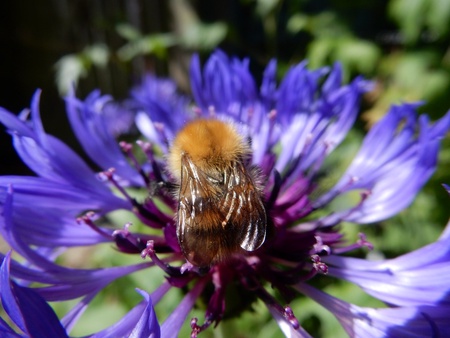Researchers at the University of Aberdeen have enlisted the help of thousands of bumblebee enthusiasts from across the UK to help inform the latest research into the best pollinating plants to have in garden.
More than 6,000 data entries gathered through BeeWatch, a UK-wide citizen scientist programme, will now inform compilers of bumblebee-specific lists of plants and flowers, helping them prepare more specific pollinator plant recommendations.
Set up by the University of Aberdeen and the Bumblebee Conservation Trust in 2011, BeeWatch is an online platform where members of the public can log and document their bumblebee sightings, along with which flowers and plants they were spotted visiting.
Widespread concern over declines in pollinating insects has led to numerous recommendations of which “pollinator-friendly” plants to grow and help turn urban environments into valuable habitat for such important wildlife.
Dr Helen Anderson, from the University’s School of Biological Sciences, was part of a team of researchers from the Royal Horticultural Society, Open University and the Swedish University of Agriculture. Their paper - Citizen science data reveals the need for keeping garden plant recommendations up-to-date to help pollinators - has just been published in Nature Scientific Reports.
“We all know that pollinators like bumblebees are in trouble and need our help – it is a global problem,” she said.
“More than 6,000 records have been submitted to the BeeWatch Planting for Pollinators site since it was first set up, and we used this data to determine food plant use by the nations’ bumblebee species, and show that much of the plant use recorded does not reflect practitioner recommendations.
“While communicated widely by organisations, and readily taken up by gardeners, “pollinator-friendly” lists often fail to recognise the stark differences among species and pollinator groups, or adapt to changing phenology or gardening practices.
“Our paper calls for the provision and use of up-to-date dynamic planting recommendations driven by live (citizen science) data to support pollinator-friendly management of garden spaces, and in the process encourage transformative personal learning journeys through gardening.
“Using citizen science data can be one of the best ways to help bumblebees if it uses up-to-date observations on plant use from data collected by members of the public. The data they provide can be much more specific about the plants used by individual bumblebee species, rather than relying on ‘pollinator-friendly’ labelling, which gives generic planting recommendations.”
The Royal Horticultural Society (RHS) will use the information from the study to further improve its recommendations for bumblebee-friendly plantings, and to inform future research.
Dr Andrew Salisbury RHS Principal Entomologist, said: “Garden flowers are a vital resource for all types of pollinators. This paper demonstrates that compilers of these lists need to stay abreast of new data as this is made available.
“We see the RHS Plants for Pollinator lists as a living resource – one which we are always seeking to improve and it is clear that gardeners’ observations are helping to improve its value.”
This work was supported by funds from the RCUK dot.rural Digital Economy Research Hub, NERC and EPSRC.


